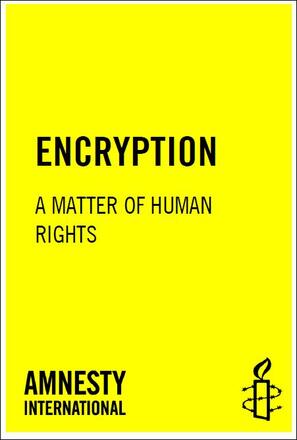
Encryption: a matte or of human rights (Amnesty International)
With more than three billion people across the world having access to the internet, encryption is an essential mean of protecting our personal information.
States have obligations under international law to respect, protect and fulfil the right to privacy of their populations. At the same time, governments are increasingly threatening and violating the right to privacy through unjustified surveillance, such as the mass surveillance programmes operated by intelligence agencies in the USA and the UK.
Amnesty International believes that, because of the critical role played by encryption in the enjoyment of these rights, restrictions on access to and use of encryption may constitute an interference with the enjoyment of human rights.
The report provides basic definitions of key notions regarding encryption, such as the distinction between end-to-end encryption and full-disk or device encryption.
It then gives references to key international documents setting the ground for the right to privacy (Article 17 of the International Covenant on Civil and Political Rights) as well as to the position recently expressed by the UN Special Rapporteur on freedom of expression.
The briefing then examines the controversy over encryption, stemming from a practical component of computer security: by securing communications against illegitimate interference by criminals, encryption also secures communications against both illegitimate and legitimate interference by government authorities.
Therefore, grounds are considered on which government may legitimately ban or restrict encryption.
Tags: Surveillance Digital rights Digital safetyThe content of this article can be used according to the terms of Creative Commons: Attribution-NonCommercial 4.0 International (CC BY-NC 4.0) . To do so use the the wording "this article was originally published on the Resource Centre on Media Freedom in Europe" including a direct active link to the original article page.

